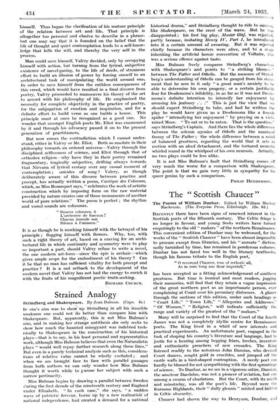Strained Analogy
Strindberg and Shakespeare. By Joan Bulman. (Cape. 6s.) IF one's aim was to show up Strindberg .in all his irascible weakness one could not "do better than compare him with Shakespeare. But, apparently, this is not' Miss Bulman's aim, and in making her strange antithesis she only seeks to show how much the haunted misogynist was indebted tech- nically to Shakespeare in the construction of his historical plays—that is to say, in his least personal and representative work, although Miss Bulman believes that even the Naturalistic plays "would well repay further research along these lines." But even in a purely technical analysis such as this, considera- tions of relative value cannot be wholly, excluded ; and when we arc brought face to face with parallel -passages from both authors we can only wonder how Miss Bulman thought it worth while to pursue' her subject with such a narrow pertinacity.
Miss Bulman begins by drawing a parallel between Sweden euring the first decade of the nineteenth century and England under Elizabeth. "In each case," she says, "a sudden wave of patriotic' fen-Our, borne- -up by a new realization' of national independence, had created a demand for a national
historical drama," -and Strindberg thought to ride to success, like Shakespeare, on the crest of the wave. But he was
• disappointed ; his first big play, Master Olaf, was rejected, -partly because, imitating Henry IV, Part .I, he introduced 'Into it a certain amount of swearing. But it was rejectect chiefly because its characters were alive, and to' a stage inheriting the artificial heroic convention of Voltaire, this was a serious offence against taste.
- Miss Bulman freely compares Strindberg's characters
with Shakespeare's and points to "a striking likenes, " between The Father and Othello. But the measure of Strind- berg's understanding of Othello can be gauged from his state- ment that he sees in it only "a great man's anxiety to be able to determine his own progeny, or a certain justifiable fear for Deselemona's infidelity, in so far as it was not Desde- mona's definite intention to intensify her enjoyment by arousing his jealousy .' . ." This is just the view that we should expect Strindberg to take, and had he written the play he would have given us a Desdemona like a female spider "intensifying her enjoyment" by preying on a Nieti- mized Moor. To eat or to be eaten. That is the question," • says Strindberg's Captain. And there lies the whole difference between the .solemn agonies of Othello and the maniacal frenzy of The Father ; the whole difference between a mind of balanced greatness, regarding the world that it sets in motion with an aloof detachment, and the tortured neurotic whirled round in the whirlpool of his own neurosis. Actually, no two plays could be less alike.
It is not Miss Bulman's fault that Strindberg comes oft very much the worse for a comparison with Shakespeare. The point is that we gain very little in sympathy for his queer genius by such a comparison.
PHILIP HENDERSON.






































 Previous page
Previous page